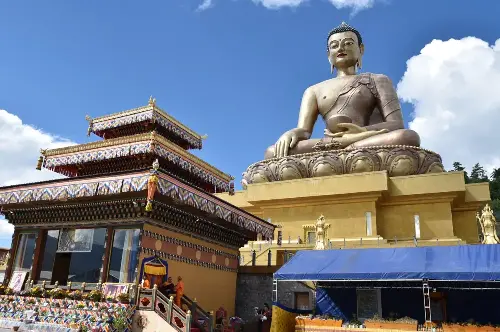
A 177ft gilded Buddha statue looks over Thimphu like a guardian angel. In front of him, a sea of monks dressed in orange, maroon and burgundy robes perform the Drolma Jigchobma Bumtshok, a practice dedicated to goddess Tara, a female deity associated with compassion, protection, and guidance.
Bhikkhunīs (nuns) of all ages make up most of the assembly reciting the mantras 100,000 times while facing the gigantic $47m Buddha Dordenma statue which was built to celebrate the 60th anniversary of fourth king Jigme Singye Wangchuck. Enclosed within the statue are an overwhelming 125,000 miniatures of Buddha occupying each corner of every wall.
Buddhism, as a religion and practice, has always piqued my curiosity. Growing up in India – the land where Gautama Buddha attained enlightenment and the Dalai Lama lives – its presence has lingered in my life, so when the opportunity arose to visit Bhutan, I took the chance to explore it both as a traveller and to seek knowledge.
I believed that finding peace and solitude would come easily in Bhutan. After all, the calmness from being surrounded by nature, the spirituality, and the simplicity of life have all contributed to it being one of the happiest countries in the world, according to the World Happiness Report. But can my husband and I get a taste of the zen life in ten days?
We start our pursuit for a meaningful life in its capital Thimphu, a metropolis with no high-rise buildings, designer stores, or traffic jams — in fact, there are zero traffic signals in the country. One smartly dressed policeman, donning white hand gloves, directs vehicles around a small roundabout where congestion is seldom an issue.
The Kingdom of Bhutan has embraced modern life but at a considerably slower pace than the rest of the world. It was the last country to legalise television and the internet in 1999, but you would not know that looking at the tech-savvy youth hanging out in karaoke bars and making TikTok videos around Clock Tower Square in the heart of town.
At the National Memorial Chorten, the stupa (similar to an ancient tumulus or burial mound) still embodies the slow way of living. The garden and its compound are a meeting spot for older residents who share their stories and wisdom with anyone who will listen. Moving prayer beads with one hand, they silently recite passages while meandering around the chorten, a three-floored shrine dedicated to the third king, packed full of intricately carved mandalas, statues, and wrathful-looking protective deities.
Bhutan's natural environment is among the most pristine in South Asia, making it home to some of the most luxurious hotels in the world. In Motithang, the upper hills of Thimphu, Amankora (doubles from £1500 per night, this website.
© The Standard Ltd
